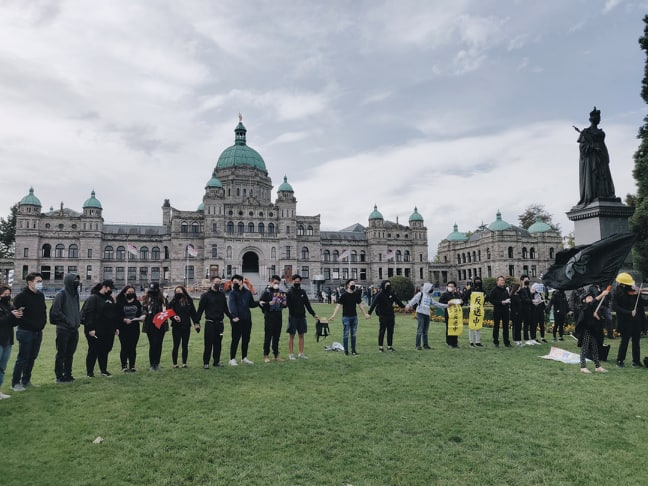Pride, pessimism, and panic expressed by UVic community members with links to Hong Kong amidst escalations of violence both overseas and in Vancouver

The Hong Kong protests that began in March aren’t showing any signs of slowing down. In February, the Hong Kong government proposed an extradition bill which caused widespread panic that China would encroach further on the freedoms of Hong Kong residents. The proposed bill would have allowed any suspected criminals to be arrested and extradited to mainland China. As the protests continue in Hong Kong, tensions have grown in Victoria and Vancouver between pro-democracy supporters and pro-China supporters. Peaceful demonstrations have quickly turned aggressive between these two groups, causing the Hong Kong community at UVic to fear potential repercussions from publicly voicing their support.
Ho Chan, the President of the Hong Kong Students’ Association (HKSA) at UVic, interned for a District Council in Hong Kong this summer and witnessed both the politics behind closed doors and the reactions on the streets. Chan and the HKSA’s Executive Council decided not to officially participate in a Sept. 29 rally organized in Victoria to support the Hong Kong protesters.The HKSA stated in a Sept. 21 Facebook post, “After thorough discussions, our executive team decided that the HKSA will not take part in any active demonstrations in Victoria, as we would not be able to guarantee the safety of our participants.”
When asked about this decision, Chan explained that they are “afraid of some conflict, like what happened in Vancouver or other institutions,” and that they will instead focus on organizing events on campus and will try to ensure people’s safety.
On the University of British Columbia (UBC) and Simon Fraser University (SFU) campuses in Vancouver, Lennon Walls were erected by students in solidarity with the protests in Hong Kong. Lennon Walls, named after John Lennon of the Beatles, originated in Prague and feature messages and designs promoting peace and pro-democracy sentiments. Lennon Walls have become a global symbol of support for the Hong Kong protests. The walls on the UBC and SFU campuses are now either under surveillance or reinforced with clear tape after previously being torn down. On Oct. 1, pro-Chinese Communist Party nationalists removed entire sections of a Lennon Wall established at the Aberdeen SkyTrain station in Richmond. The students who organized the rally faced verbal and physical abuse prompting police involvement.
“China’s penetration is not only in Hong Kong, it’s everywhere. In Canada, [it’s in] the Greater Vancouver area specifically,” said Guoguang Wu, a political science professor at UVic who specializes in comparative politics and the Global South (specifically China, Hong Kong, and Taiwan).
Wu says that he admires the people of Hong Kong who are standing up for the next generation but admits that despite his desire to organize panels and events on UVic’s campus to talk about Hong Kong and the ongoing protests, “to let our community know why this happened,” he says that he must be “self-disciplined and self-censored.”
Aside from UVic’s HKSA, Victoria does not have an official Hong Kong association. Nick, a UVic student who requested to remain anonymous, participated in the protests in Hong Kong over the summer, and calls the Hong Kong community in Victoria “quite fractured.” He has, however, been pleasantly surprised by the high level of participation in events and solidarity rallies in Victoria. “Spaces like [the HKSA] are quite valuable,” he continued, “there have been individuals … that have reached out about getting connected to a Hong Kong community after the summer.”
The extradition bill that initially sparked the demonstrations in March was officially withdrawn on Oct. 23 by Hong Kong’s Secretary for Security, John Lee Ka-chiu. Despite this move, the protests in favour of autonomy from China have continued. Both Wu and Chan are concerned for Hong Kong’s future with Wu stressing the importance of international support for Hong Kong. He believes it would be extremely dangerous if Hong Kong is abandoned “to deal with Beijing and the SAR [Special Administrative Region] government,” and says that he is pessimistic about the city’s democratic future.
Chan is proud of the commitment shown by the students involved in the protests, but shares Wu’s pessimism.
“I think we are the dreamers, we try to make our dream of Hong Kong come true,” he said. “The city has an expiry date: July 1, 2047.”
That date marks the official end of the Sino-British Joint Declaration, signed by the United Kingdom and the People’s Republic of China which came into effect in 1997. The declaration stipulates that Hong Kong will be allowed to maintain its way of life without significant influence from China for 50 years.
Once the official treaties and agreements expire, Chan says that “the Chinese government will absolutely take over Hong Kong on that day.”
Both the short-term and the long-term future of Hong Kong is unknown, and as Nick reinforces, “[this question] is on the minds of many, many people.”







